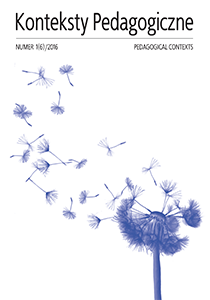Abstrakt
Tekst stanowi próbę określenia możliwości i ograniczeń realizacji założeń zrównoważonego rozwoju na poziomie edukacji formalnej w kontekś cie poszanowania kultury i natury. Autorki odnoszą się do dwóch obszarów edu-kacji – artystycznej i środowiskowej – które łączy istnienie związków między bioróżnorodnością a różnorodnością kulturową. Wspólne cele tych edukacji (wrażliwość), wspólne sposoby oddziaływań wychowawczych (doświadczanie wielozmysłowe) i wspólny obszar treściowy (edukacja kulturowa) autorki wska-zują jako czynniki sprzyjające urzeczywistnianiu koncepcji, zaś strukturę i język programu nauczania jako potencjalne zagrożenie.
Bibliografia
Cultural Diversity and Biodiversity for Sustainable Development, Johannesburg 2003.
Dewey J., Sztuka jako doświadczenie, przeł. A. Potocki, Wrocław 1975.
Ferenz K., Konteksty edukacji kulturalnej. Społeczne interesy i indywidualne wybory, Zie-lona Góra 2003.
Frydryczak B., Kultura i nastroje, [w:] Aksjotyczne przestrzenie kultury, red.R. Tańczuk, D. Wolska, Wrocław 2005.
Gołaszewska M., Kultura estetyczna, Warszawa 1989.
Grzegorczyk A., Etyka w doświadczeniu wewnętrznym, Warszawa 1989.
Jabłońska M., Nieprzejrzystość estetyczna światów dziecięcych, [w:] Estetyka, sztuka, me-dia. Przestrzenie i kontekstypedagogiczne, red. M. Jabłońska, Wrocław 2008.
Labonte R., Econology: Integrating health and sustainable development. Part one: Theory and background, „Health Promotion” 1991, nr 6.
Malinowska J., Uczeń jako badacz w procesie edukacji, [w:] Pedagogika wczesnoszkolna, t. 2, Uczeń i nauczyciel w zmieniającej się przestrzeni społecznej, red. I. Kopaczyńska, M. Magda-Adamowicz, M. Nyczaj-Drąg, Toruń 2014.
Migasiński J., Merleau-Ponty, Warszawa 1995.
Ministerstwo Edukacji Narodowej o nauczaniu przyrody, oprac. B. Hiszpańska i in., War-szawa 1999 (Biblioteczka Reformy, 14).
Skoczylas A., Słowo wstępne. Problemy edukacji plastycznej, „Sztuka” 1984, nr 4.
Soida D., Bądź mistrzem-przyjacielem,czyli edukacja ekologiczna na wesoło, Kraków 2000.
Wallis M., Wybórpism estetycznych, oprac. T. Pękala, Kraków 2004.
Welsch W., Estetyka i anestetyka, przeł. M. Łukasiewicz, [w:] Postmodernizm. Antologia przekładów, red. R. Nycz, Kraków 1998.
Welsch W., Estetyka poza estetyką. O nową postać estetyki, przeł. K. Guczalska, Kraków 2005.
Wilkoszewska K., Estetyka pragmatyczna, [w:] Estetyki filozoficzne XX wieku, red. K. Wilkoszewska, Kraków 2000.
Netografia
Edukacja artystyczna i kulturalna w szkołach w Europie, 2009, Bruksela (EACEA, P9 – Eurydice), http://www.eurydice.org.pl/sites/.../PL_edukacaja_artystyczna.pl [do-stęp: 14.01.2016].
http://www.ios.edu.pl/biodiversivity/5/rio.html [dostęp: 14.01.2016].
Mapa Drogowa UNESCO dla edukacji artystycznej, Lizbona 6–9 marca 2006, Lizbona, http://www.unesco.pl/fileadmin/user.../Mapa_Drogowa.pdf [dostęp: 14.01.2016].
Narodowa Strategia Rozwoju Kultury na lata 2004–2013, http://bip.mkidn.gov.pl/media/docs/Narodowa_Strategia_Rozwoju_Kultury.pdf [dostęp: 12.12.2013].
Plan z Seulu: Cele rozwoju edukacji artystycznej, 25–28 maja 2010, Seul, http://www.unesco.pl/fileadmin/user.../Plan_z_ Seulu.pdf [dostęp: 14.01.2016].
Podstawa programowa, http://bip.men.gov.pl/men_bip/akty_prawne/rozporzadze-nie_20081223_zal_2.pdf [dostęp: 14.01.2016].
Strategia Rozwoju Edukacji na lata 2007–2013, http://www.arch.znp.edu.pl/files/ak-tualności/strategia_edukacja.doc [dostęp: 12.12.2013].S
trategia Zrównoważonego Rozwoju Polski do roku 2025, http://www.nape.pl/Por-tals/NAPE/does/akty_prawne/strategie/strategie/Strategia_zrownowazonego_roz-woju_2025.pdf [dostęp: 14.01.2016].
http://bip.men.gov.pl/men_bip/akty_prawne/rozporzadzenie_20081223_zal_2.pdf [dostęp: 14.01.2016].
Uzupełnienie Narodowej Strategii Rozwoju Kultury na lata 2004–2020, http://bip.mkidn.gov.pl/media/docs/050617nsrk_uzupelnienie.pdf [dostęp: 12.12.2013]
Autor zgodnie z zaleceniem MNiSW, by przeciwdziałać praktykom „ghostwriting” i „guest authorship” składając tekst dołącza oświadczenie Autora/Autorów, w którym deklaruje wkład każdego z Autorów w powstawanie publikacji. Własnoręcznie podpisane oświadczenie należy przesłać na adres redakcji:
Joanna Skibska | w formie skanu przesłać poprzez system OJS (biblioteka wydawcy).
Autorzy nie ponoszą żadnych kosztów w związku z publikacją artykułu na łamach czasopisma Konteksty Pedagogiczne oraz nie otrzymują gratyfikacji finansowej za opublikowanie tekstu. Redakcja zastrzega sobie prawo do wprowadzania niewielkich zmian w artykułach, które nie mają wpływu na merytoryczną stronę publikacji.
Autor (Autorzy) artykułu oświadcza, że przesłane opracowanie nie narusza praw autorskich osób trzecich. Wyraża zgodę na poddanie artykułu procedurze recenzji oraz dokonanie zmian redakcyjnych. Przenosi nieodpłatnie na Wydawnictwo Libron autorskie prawa majątkowe do utworu na polach eksploatacji wymienionych w art. 50 Ustawy z dnia 4 lutego 1994 r. o prawie autorskim i prawach pokrewnych – pod warunkiem, że praca została zaakceptowana do publikacji i opublikowana.
Wydawnictwo Libron posiada autorskie prawa majątkowe do wszystkich treści czasopisma. Zamieszczenie tekstu artykuły w repozytorium, na stronie domowej autora lub na innej stronie jest dozwolone o ile nie wiąże się z pozyskiwaniem korzyści majątkowych, a tekst wyposażony będzie w informacje źródłowe (w tym również tytuł, rok, numer i adres internetowy czasopisma).
Tekst jest udostępniany w internecie na licencji CC-BY-SA

